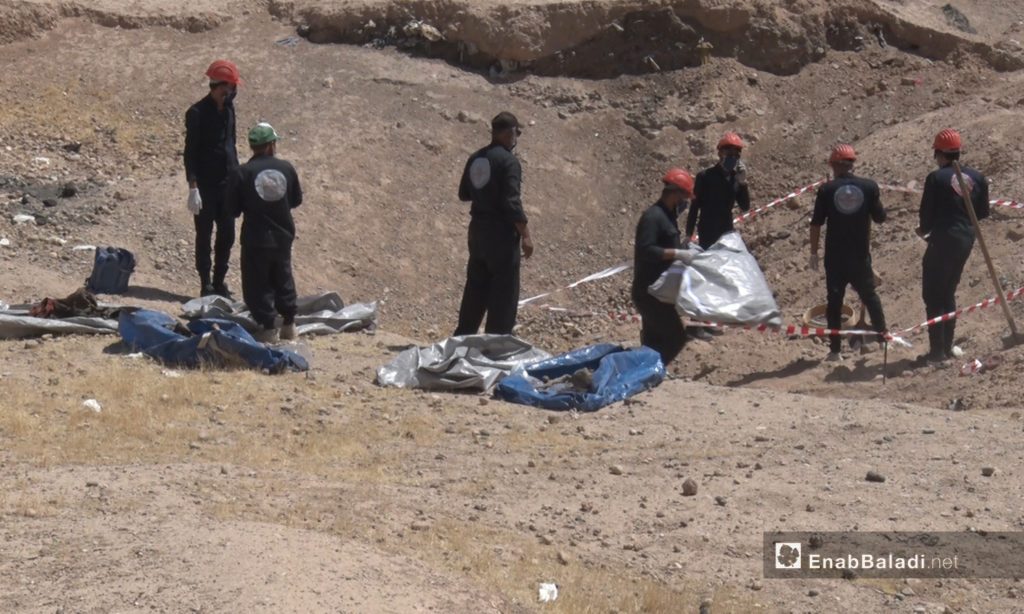Raqqa – Hussam al-Omar
As a result of airstrikes conducted by the US-led coalition against the Islamic State (IS) group in Raqqa, Shamsa with her children were fleeing their city, while the sounds of the bullets of the battles between the Kurdish-led Syrian Democratic Forces (SDF) and the IS group were approaching, striking fear into their hearts.
“We managed to make a quick exit. We lost each other, but at the end, we were able to gather except for Khaled,” the 50-something-year-old woman told Enab Baladi about the incident that took place in 2017 when she lost her son, who was 19 years old at that time.
The families of thousands of people who have been forcibly disappeared are still trying to find out their loved ones’ fate three years after IS forces were expelled from Raqqa, which is now under the control of the SDF. While the identities of thousands of bodies found in mass graves have not yet been verified, the residents’ eyes are set on the new authority in search of answers.
Research of missing persons is pointless
Shamsa Nafi’s search for her son Khaled did not lead to any results over the past three years; she told Enab Baladi. She added that she made several visits to the missing person institutions affiliated with the ruling Autonomous Administration of East Syria (ES) and Raqqa’s First Response Team (RFRT) responsible for retrieving the bodies, all in vain.
Shamsa hopes to obtain evidence of the whereabouts of her missing young son, praying to God to find him alive, or to know with certainty of his death and to be able to bury him in a place where she can visit him, as is the case with others who lost loved ones.
Although the Raqqa Civil Council-linked RFRT uncovered 6,070 bodies in 27 different mass graves, as of November, the RFRT members were only able to identify 700 bodies, while most bodies remain unidentified because the RFRT lacks advanced DNA analysis devices to identify human remains.
The people of Raqqa confirm that the majority of the bodies belong to those who were killed by the bombing of the city during the battles, and were buried in a hurry, and were not detained by the IS group even though that there are tens of indications that the majority of the mass graves discovered were at the hands of IS forces.
When Raqqa was under the control of the IS group, the city saw the kidnapping and arrest of many civil rights activists and individuals charged with association with the Free Syrian Army (FSA) or other “enemy parties.”
Several field executions were also carried out by IS fighters, as a result of which hundreds of people were killed in Raqqa, in addition to the presence of a large number of civilians in the IS’s detention facilities.
Unearthed graves
One of the most important unearthed graves was “Tell Zaidan,” east of Raqqa, from which the RFRT members have recently finished retrieving the bodies. Most of the exhumed bodies belong to the Syrian regime forces, arrested by IS forces when they took over “Tabqa airport” in 2015.
A few months ago, the “SDF” handed over the Syrian regime some bodies of its elements discovered in a mass grave in the “93rd Brigade” in Ain Issa, controlled by IS in 2015.
Calls fall on deaf ears
Saber al-Nayef, from the village of Hazima in the northern countryside of Raqqa, lost one of his sons during the battles that took place in the north of the village, after he was arrested by the IS group, under the pretext of communicating with the “SDF.”
Al-Nayef was later arrested for the same reason. However, the IS group released him due to his old age and heart disease but kept his son.
Al-Nayef told Enab Baladi that his imprisoned young son stayed alive until the last period of IS’s control of the village, but the rest of the story is still unknown. “We have repeatedly tried to ask about him inside the SDF’s detention facilities, but to no avail until now.”
There have been repeated calls by the human rights organizations to the ES to search the missing persons’ files at the IS groups’ hands and cooperate with their families. Human Rights Watch (HRW) stated, in its report issued last August, that the authorities did not allocate resources to search for the missing persons or seriously consider their families’ requests.
HRW also called for establishing a central system to communicate with the families of the missing and the kidnapped, and have access to the main intelligence information on suspected members of the IS forces and the available evidence about them, and information related to exhuming mass graves. Nonetheless, the ES has not responded yet, and the families are still waiting.

